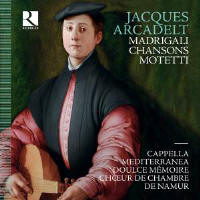Texte paru dans: / Appeared in: |
|
|
Outil de traduction ~ (Très approximatif) |
|
|
Reviewer: Barry
Brenesal
Belgian musicologist Jérôme
Lejeune has a history of combining several of the major ensembles that
record for his Ricercar label, as elements in complex projects. Even when
the contributions are uneven, the results are usually impressive, as they
are on this fine release.
Of the three discs, that
devoted to 23 of Jacques Arcadelt’s madrigals is the most successful.
Cappella Mediterranea is reduced here to six singers and three
instrumentalists, with the ensemble’s founder and leader, Leonardo Garcia
Alarcón, performing on several pieces (such as Tante son le mie pene)
at the harpsichord or organ. The artistic leadership is in the hands of
Fabian Schoffrin, who balances and points the music’s voices expertly. Aural
variety is ensured in part by Arcadelt’s expressive range (which, while not
as vivid as the later Italian mannerists such as Luzzaschi and Gesualdo, is
still considerable) and textural variety—the latter ensured in part by
dividing the voices of some madrigals between solo voice and divided
accompaniment. This was a practice inherited from the frottole,
especially in madrigals that concentrated all the interest in a single vocal
line, while assigning no text to the rest. All the soloists are excellent,
for vocal production, enunciation, and tonal resources. Of particular merit
is Carlo Vistoli in Dolce nimica mia — one of the few countertenors
I’ve heard whose voice doesn’t sound perpetually hooded, but capable of a
range of colors and deployed with very persuasive phrasing.
Denis Raisin Dadre, the leader
of Doulce Mémoire, candidly admits in his brief liner notes that when
contacted by Lejeune to perform an album of Arcadelt’s chansons, he began
studying them with expectations of finding an “unnecessary and uninspired
copy of Claudin de Sermisy.” This didn’t prove the case, and 24 of the
composer’s 126 chansons were added to the set. Here, my concerns center on
soprano Clara Coutouly, whose white, usually vibratoless tone was also a
feature of her predecessor with Doulce Mémoire, Véronique Bourin. Clearly,
hers is a sound that Dadre wants, but I find her enunciation poor, her
production sometimes breathy, and her tonal qualities too often drawing
attention to themselves in an unappealing way, as they separate out
completely from surrounding vocal textures. The reverberant venue only
highlights this “boy alto” sound as she rises in her higher register. (In
fairness, this is not invariably the case. She manages a standard vibrato
without any issues in both the solo and polyphonic sections of Il me
prend fantasie, and fits well among her peers.)
That noted, Dadre’s selection
of chansons is excellent, from the popular and exuberant homophony of Les
yeux qui me sçeurent prendre to the five-part polyphony of the sensuous,
mildly chromatic Quand je me trouve auprès de ma maitresse. Two
settings of the latter are heard on this release, the second featuring a
vocal soloist as recorders take the other parts. There are also vocal and
instrumental versions of De mes ennuys, the latter arranged for harp
and lute. Whatever the textures selected for any of the chansons, Doulce
Mémoire performs with the same mix of spirit and technique that they’ve
shown in previous releases.
Finally, Alarcón leads the
Choeur de Chambre de Namur in a selection of 10 sacred works by Arcadelt.
Listed as motets on the jewel box, one is in fact the Agnus Dei drawn from
the composer’s Missa Ave Regina Caelorum, and performed on the
positive organ. The choir consists of 15 members in a S-CT-T-Bar-B
arrangement, with organ accompaniment discreetly provided by Adrià Gracia.
(For a decidedly different approach, Simon Ravens conducted several
selections of Arcadelt’s sacred music that featured his Musica Contexta,
accompanied by the English Cornett and Sackbut Ensemble. This album,
Chaconne 0779, was reviewed in Fanfare 36:2 by J. F. Weber.) The performances are excellent, though I find the placement of the singers at a moderate distance from the microphone drains their voices of some warmth and edge. The latter in turn obscures the polyphonic aspects of these works, with the solo voices in the Lamentatio Jeremiae in five parts succeeding best, and the Filiae Jerusalem in four, with no solos, the worst. None are unlistenable, by any means, but these motets deserve better.
Finally, there are three
additional works in the program, not by Arcadelt. Franz Liszt came across
Pierre-Louis Dietsch’s Ave Maria (after Arcadelt) in 1862 in Rome. Both
Dietsch’s choral work, and Liszt’s Ave Maria d’Arcadelt for organ, are
appended to the motet album, while Angélique Mauillon performs Trabaci’s
Ancidetemi pur on the triple harp at the conclusion of the chansons
disc. All these performances are excellent. Texts and translations are provided, as well as one of Lejeune’s thoroughly researched essays. Reservations about Dulce Mémoire’s Clara Coutouly and the sound of several of the motet selections aside, this is a welcome addition to the Arcadelt catalog. Anyone interested in the 16th-century resurgence and transformation of the madrigal, as well as the unique musical character Arcadelt brought to his works, will want to give serious consideration to this album. | |
|
|
|
|
Cliquez l'un ou l'autre
bouton pour découvrir bien d'autres critiques de CD |
|




